English
Türkçe bölüm için lütfen buraya tıklayın.
Hello everyone!!!
I hope you are well or are trying to be well. Recently, I haven't found the motivation to write posts, but I am here now and unfortunately I am here with the last spot of my trip to the Aegean region. After this, I will continue with my trip to Central Anatolia. Again, unfortunately, we are approaching the end of the trip I made this year. Therefore, sadly, I will no longer share the From All Over Türkiye that I share on Thursdays. I don't want to finish this series in such a short time.
Now we are with you again in Dalyan, Muğla. This time we will go a little over the sea and go somewhere. After Iztuzu beach, our day did not end there, which I mentioned in my blog that I added the link to. I also mentioned that I witnessed wonderful things on the road and now I want to talk about them. Also, in the continuation of my article, I will talk about the ancient city of Kaunos, which is on the UNESCO World Heritage Temporary List.
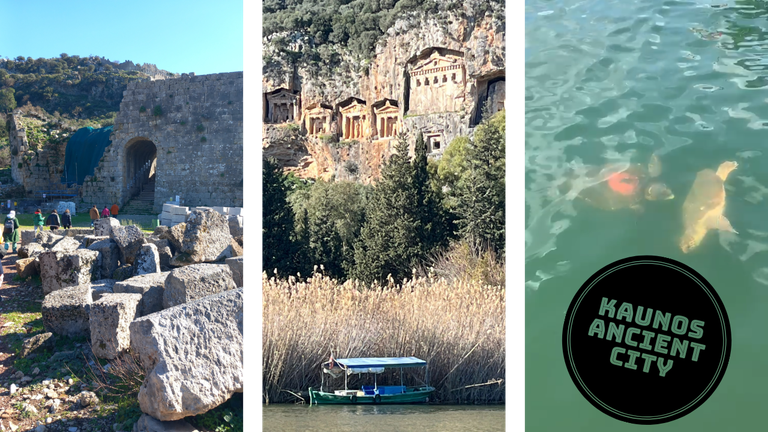

Getting there
I heard from my head guide that it is difficult to use the land road to reach Kaunos. I mean, if I remember correctly, it is almost impossible. So we used the sea route and 3 boats were arranged for almost 110 people. At the end of the beautiful day on this boat, we sailed along with the music to have a little more good time.
Of course, we also accompanied the songs with our ‘crow’ voices 😂 Actually, I expected this road to take a little shorter, but we went on and on, about half an hour.
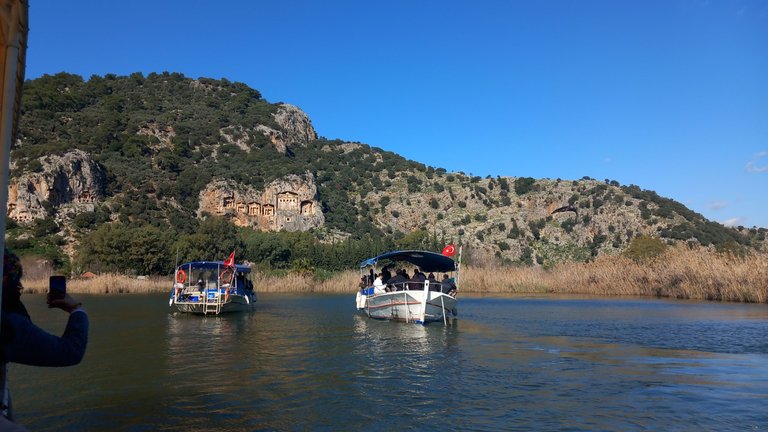
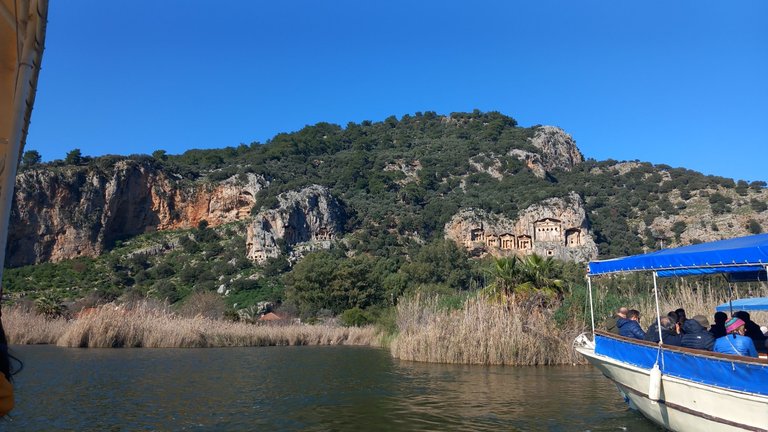
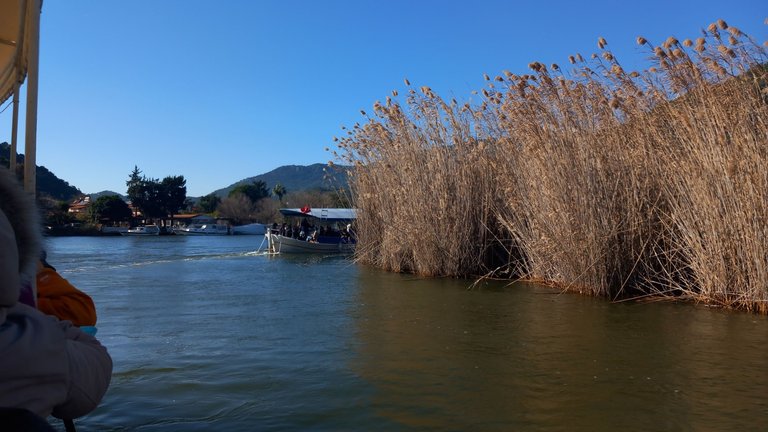
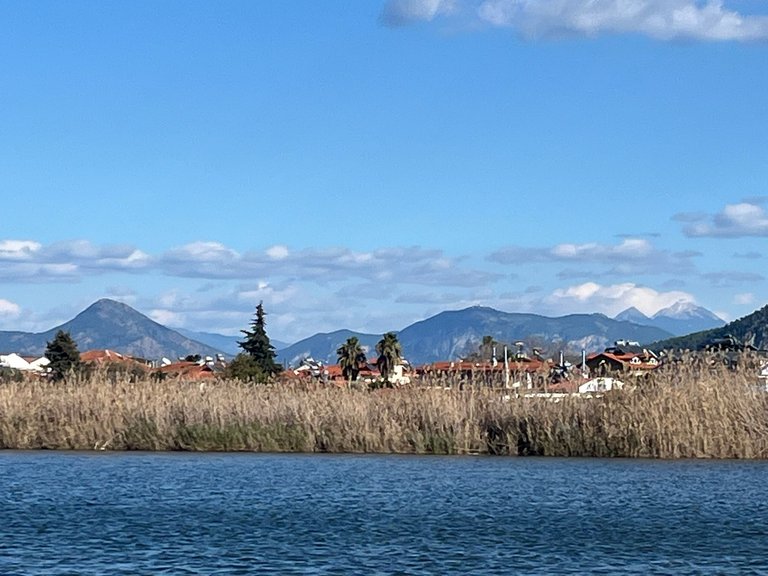
I wanted to show you in this way that we have some wonderful landscapes because I think they are breathtakingly beautiful. You can also see the ancient rock tombs that you can see above, which we cannot reach on foot or in any other way. These reeds also have a story in Ancient Greek Mythology and I can talk about this story another time if you like.
https://youtube.com/shorts/KPjXUloKxIA?feature=share
I would also like to mention that on our way we also witnessed the dance of Caretta carettas, the inhabitants of Iztuzu beach. It was very beautiful. If they had continued, we would not have moved the ship by force and would have continued to watch. Everyone was focused on the Carettas as if they were mesmerised and were taking videos. When will we come across such a thing again? We were very lucky.

Kaunos Ancient City
This ancient city, located between Ancient Lycia and Caria, dates back to the 10th century BC. We are talking about 3000 years. I rounded it up a bit, but it is still not a little time. It is also possible to comment that this city was one of the key places in terms of both transport and trade with Lycia and Caria of the period.
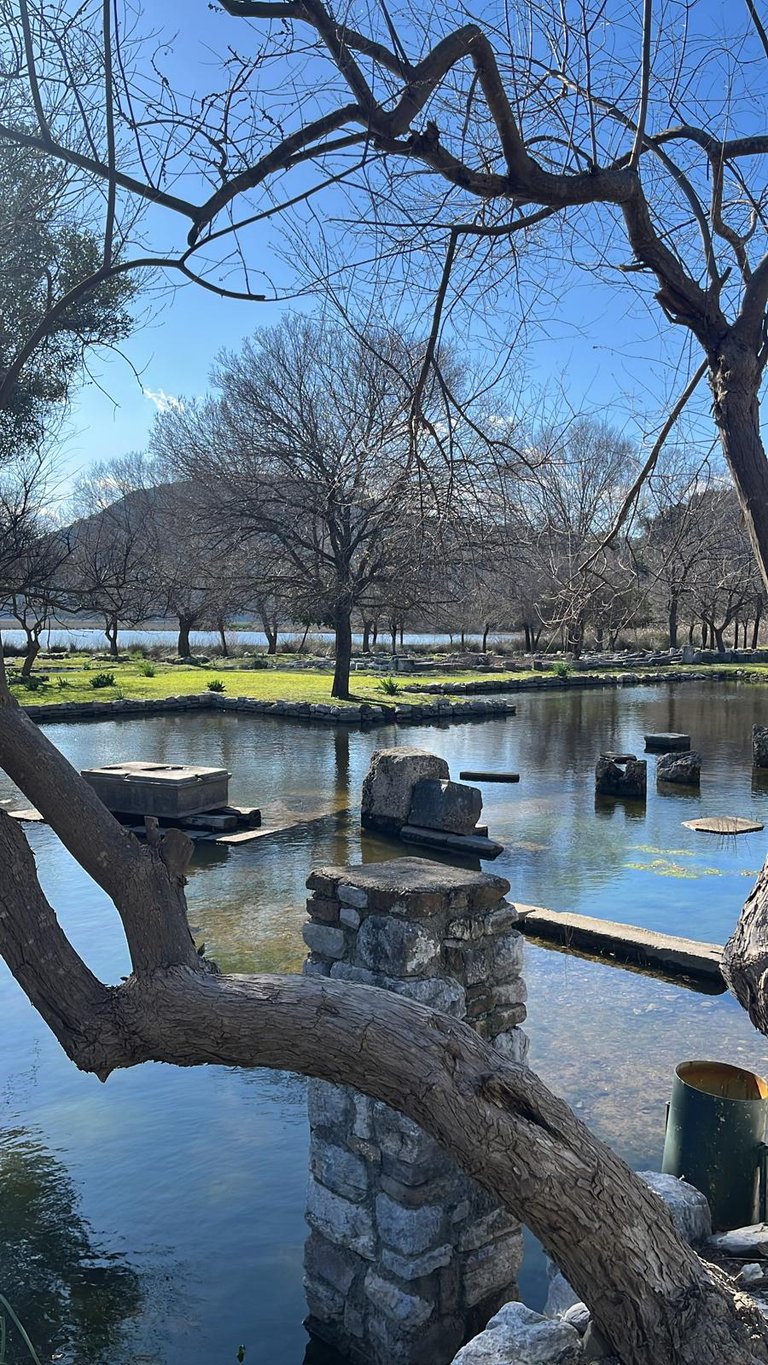

Let me talk a little bit about the name because this name comes from Kaunos, the son of King Miletus, but I personally did not like this name very much. The reason is Kaunos' forbidden love for his own sister. After this love was learnt, Kaunos was exiled here, but he turned the city from an empty place into a living space. I don't know whether he did good or bad, but if there is any good, this city has been included in the UNESCO Temporary World Heritage List since 2014. These rock tombs I will talk about in a moment are very important.
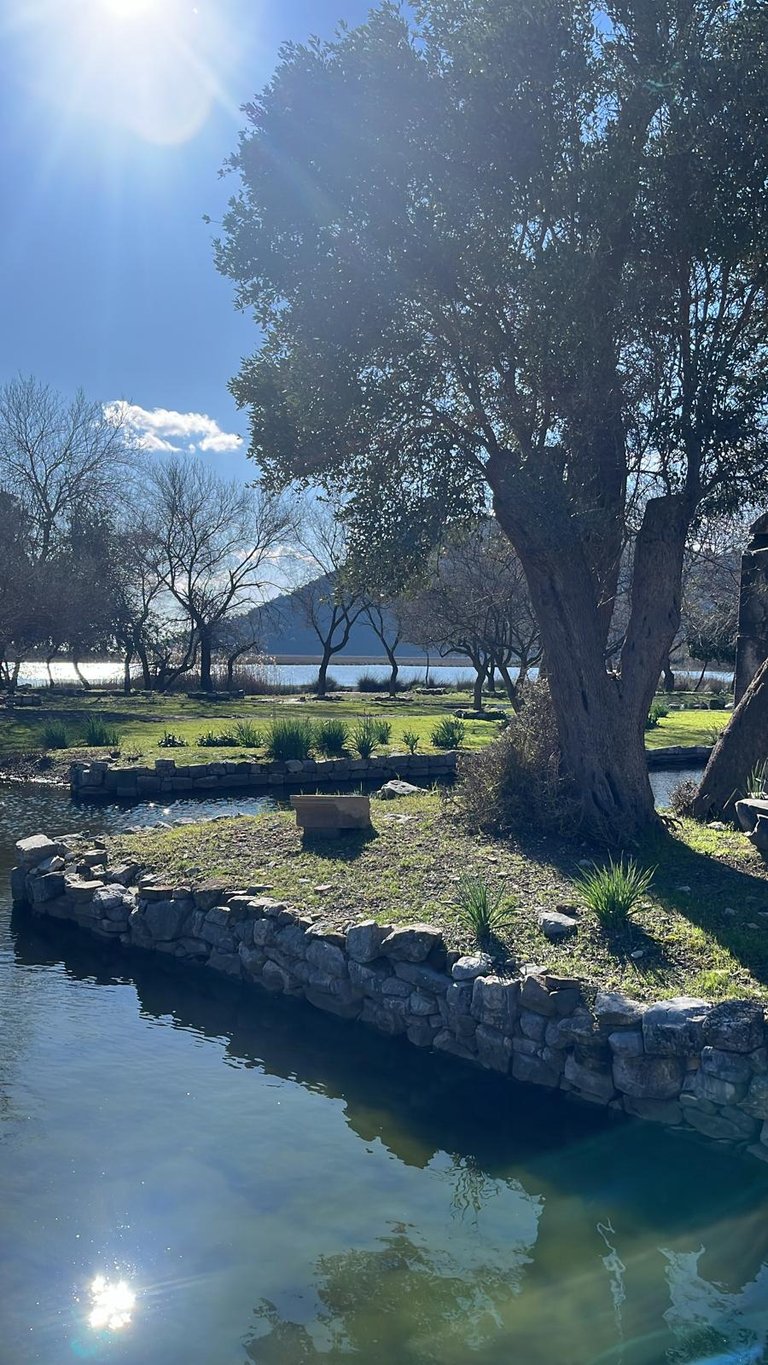
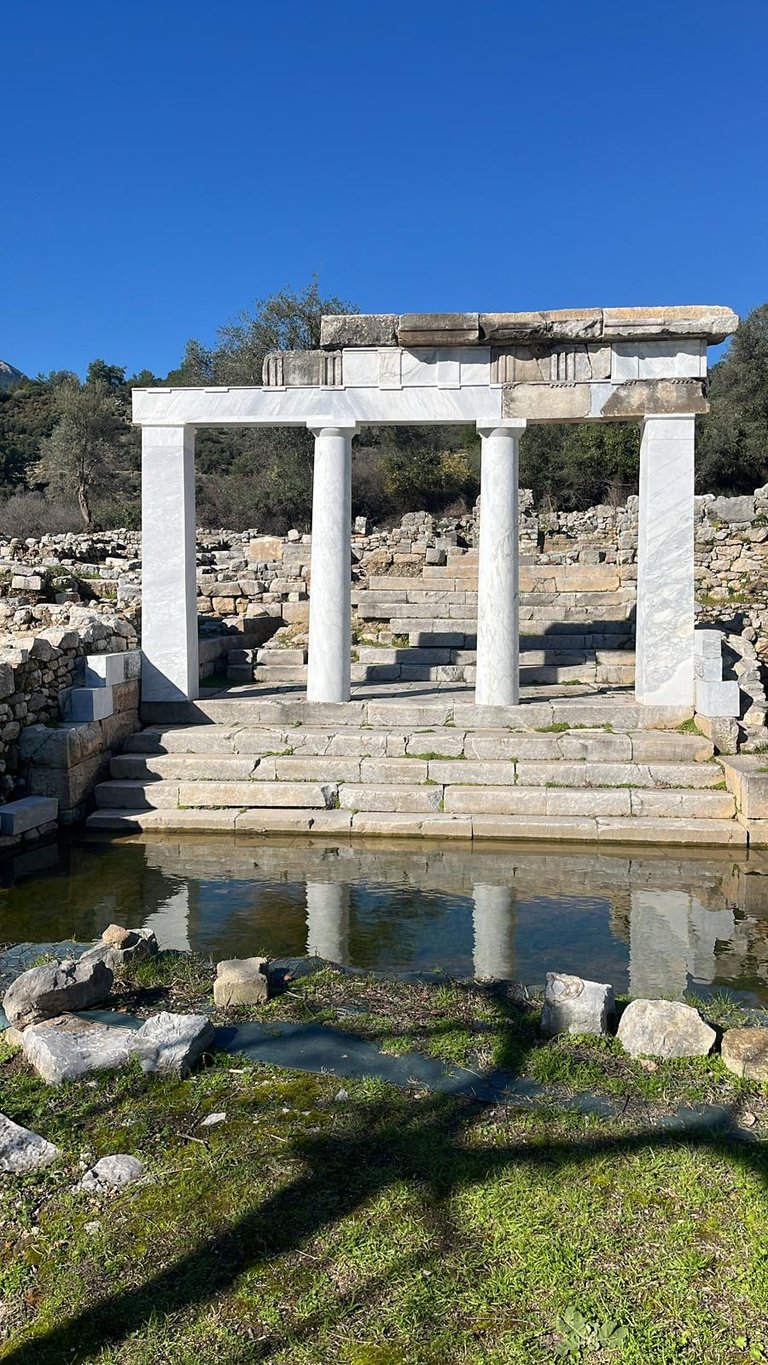
Although the city belonged to Lycia in the early times, it was later included in the territory of Caria. In addition, thanks to its geographical location, I think it is appropriate to say that it has always been cherished. The area is now like a swamp due to the recession of the sea caused by the change of the world. I think you can already understand more or less from the photos above. We did not enter the places where we saw mud. We acted a little safer. Even though it was the end of the day, after all, we had clothes to protect.
Of course, it is not only today's people who are affected by this situation, we can say that it has lost its commercial importance due to the sea that started to recede from the old times.
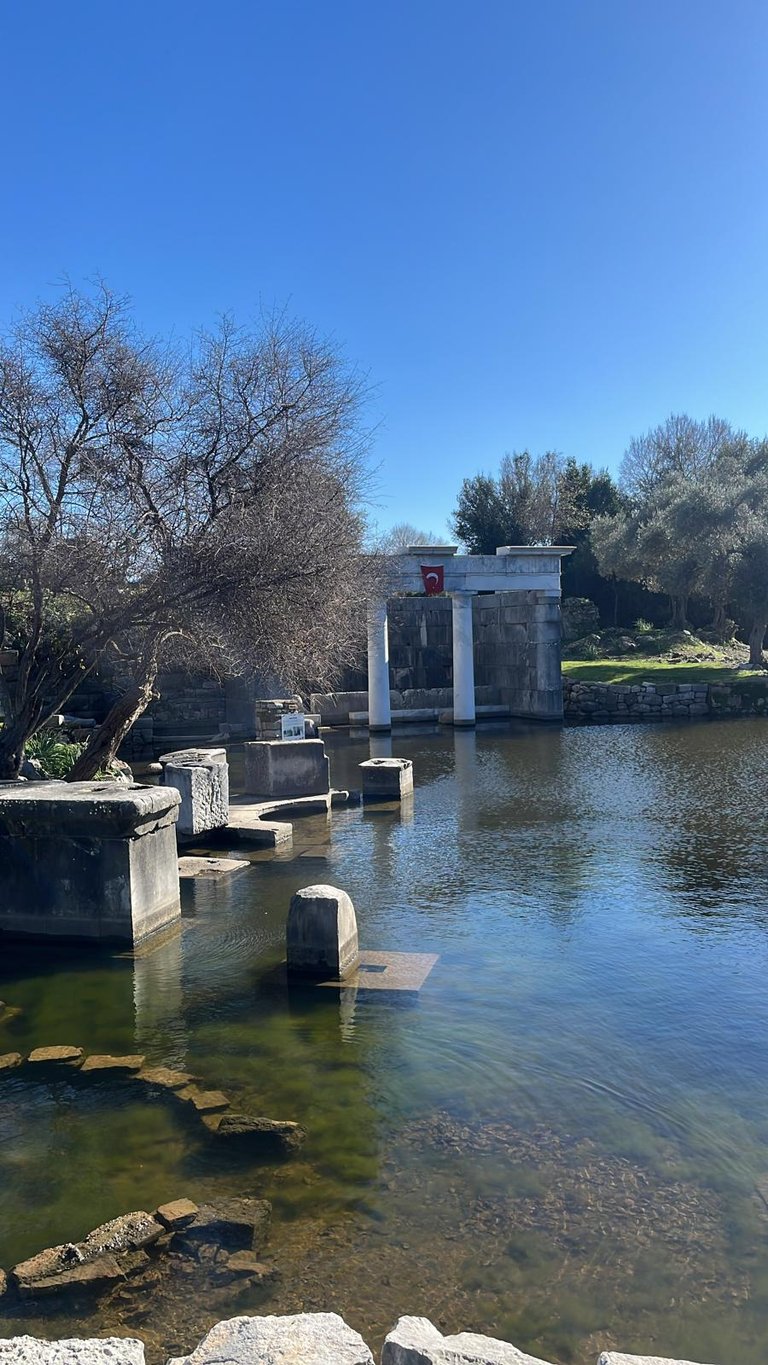
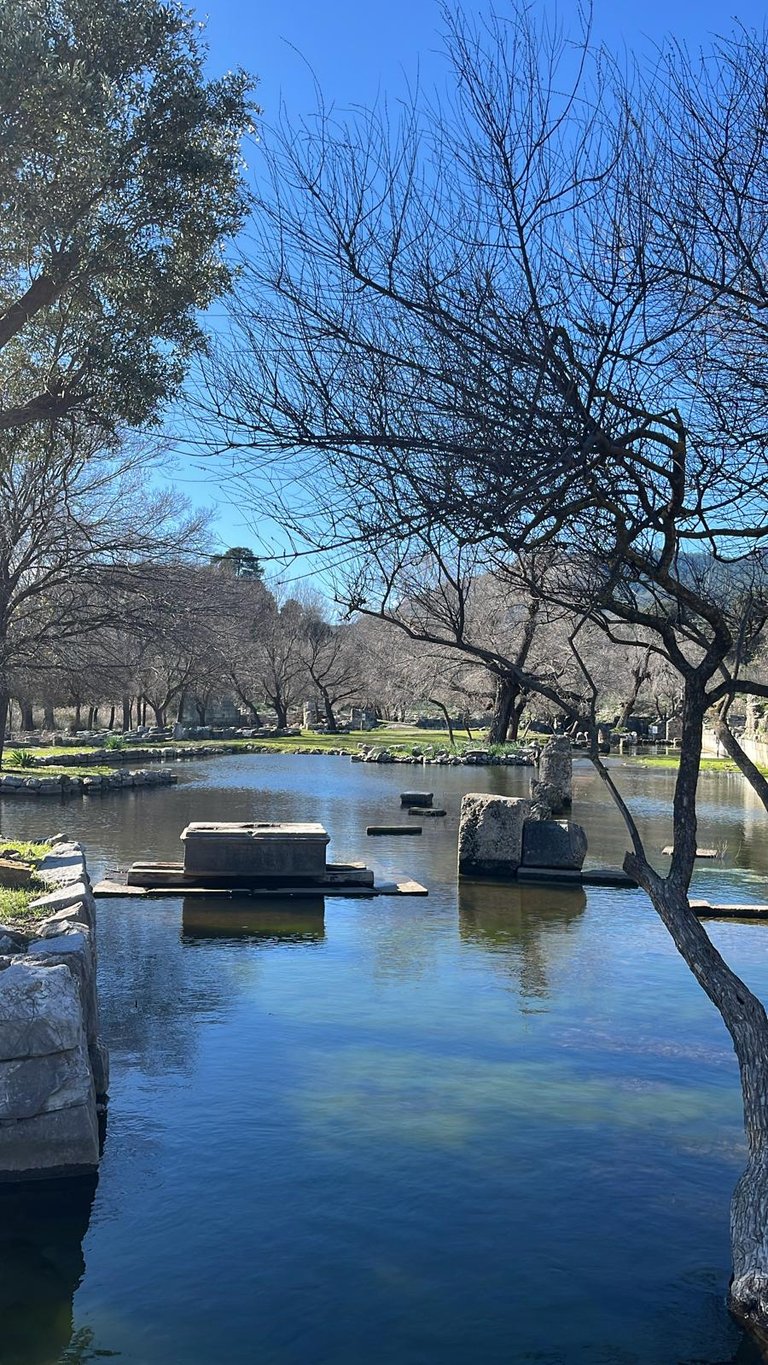
I would also like to add that according to Herodotus, the people of Kaunos introduced themselves as Cretans, although they were from the indigenous people of Caria. The famous geographer Strabon, on the other hand, writes that Kaunos had a harbour and shipyard that could be closed.

Theatre
The theatre of the ancient city of Kaunos is one of the most important structures reflecting the architectural and cultural richness of the ancient period. The theatre, which is located on the slope at one of the highest points of the city, is a little smaller than the theatres we have visited before with a capacity of 5000 people, but it is still dazzling.
As you can see in the photo above, they made the steps with different colours towards the bottom in this way for our safety. Although it was not as well preserved as the theatre of the ancient city of Priene, it was not bad. It became a little more climbable with the patching of some parts.
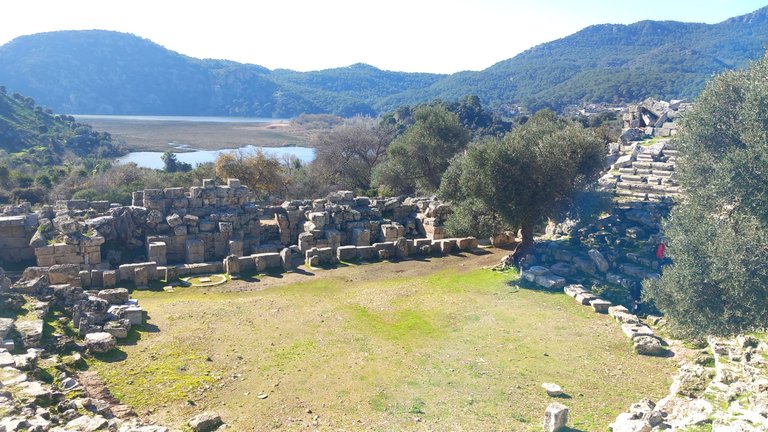

Roman Baths
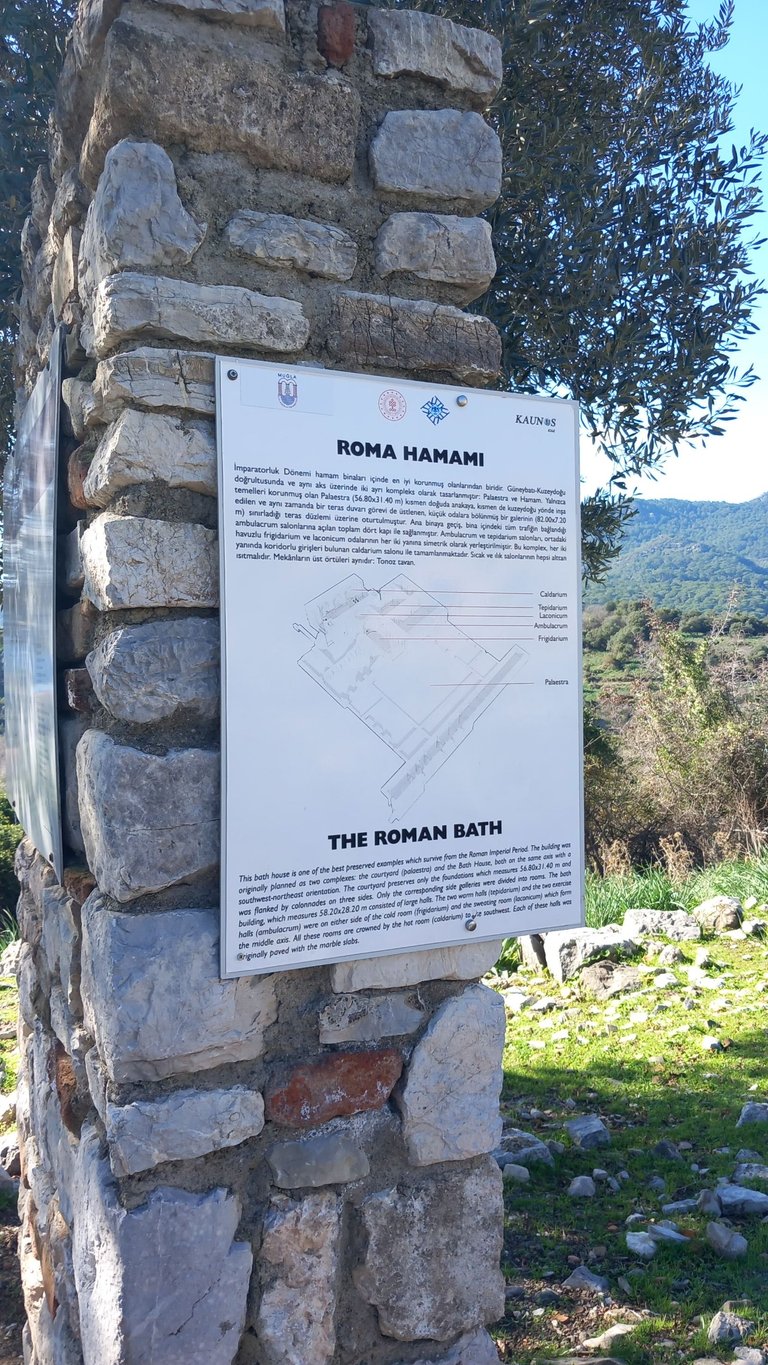
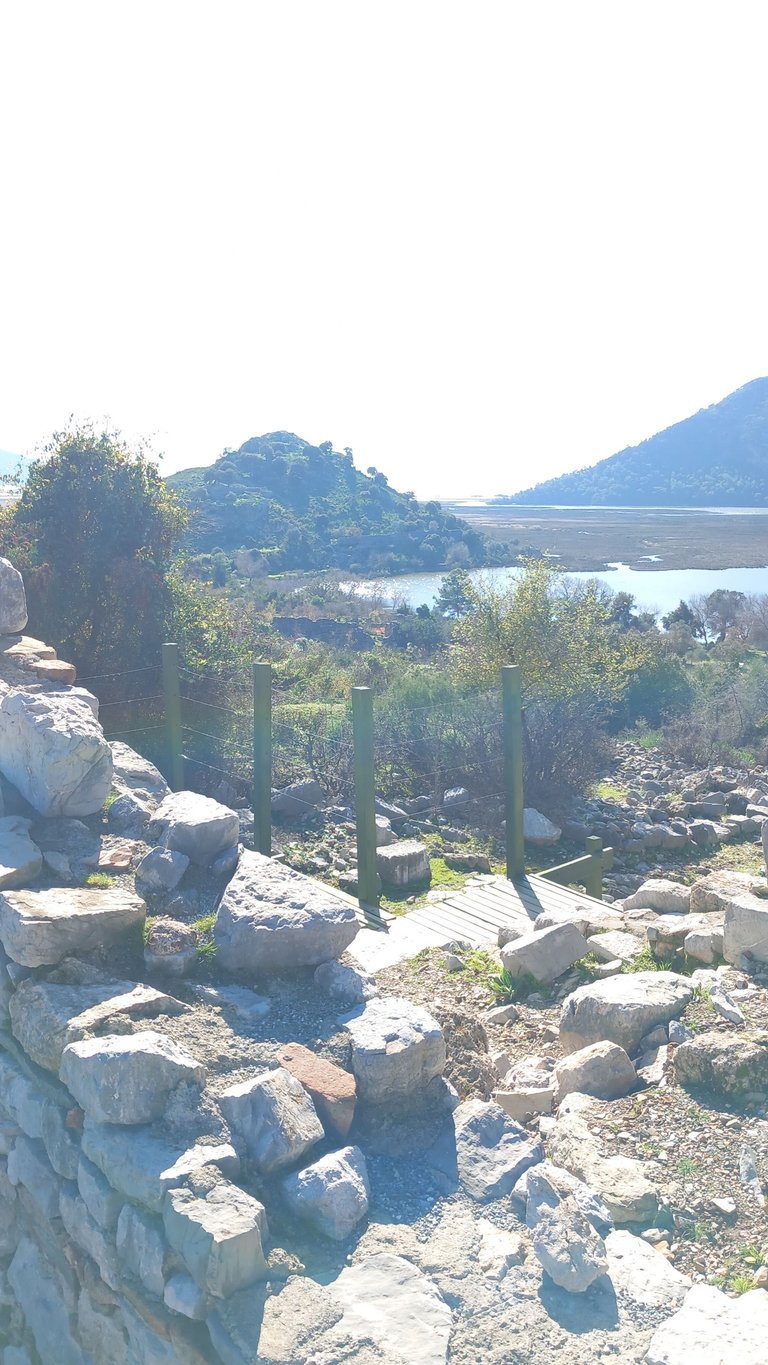
I mentioned above that it was one of the commercial and popular cities. I can say that this bath is one of the results of this. As you know, in Ancient Rome, baths were used not only for cleaning but also for socialising. I don't know if you have seen it before, but the situation was not very different in the toilets called Latrina. Think about it, this need, which is quite hidden today, was in an area where up to 10 people could be in the past. It would be strange for the baths of such a social nation to be separate.

Rock Tombs
The rock tombs of Kaunos are among the most iconic and impressive structures of the ancient city. Dating back to the 4th century BC, these tombs are one of the first things you come across on the way to the ancient city with their magnificent facade carved into the high rocks. The tombs, which are thought to have been built in honour of the founder of the city, Kaunos and the nobles, are also home to Lycian-style tomb architecture. These tombs with temple facades decorated with Ionic columns attract attention with their construction techniques and artistic details.
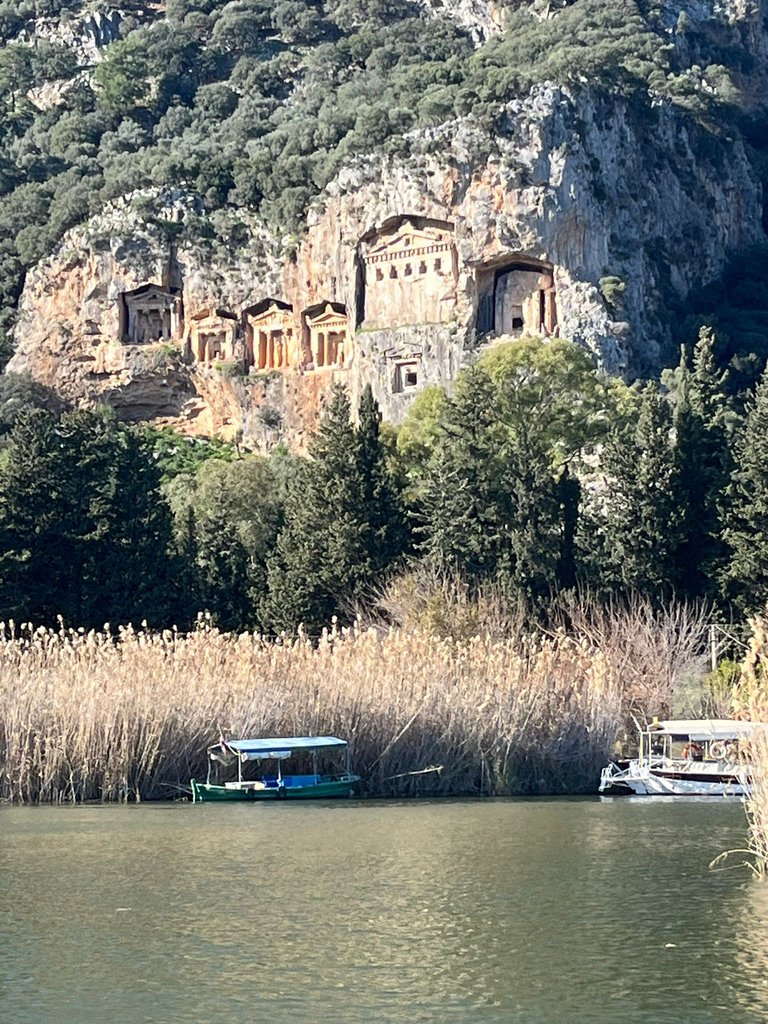
These tombs were conceived not only as monuments, but also as structures with religious and cultural meanings. Our chief guide told us that the three stone beds in the tombs were designed as areas where the dead were lying down, and added that they give clues about the burial traditions of the period. The location of the tombs reflects the beliefs of the people of Kaunos about life after death; their high position may have been chosen to bring the deceased closer to the gods. You may have noticed that I like to make comments like this 😂
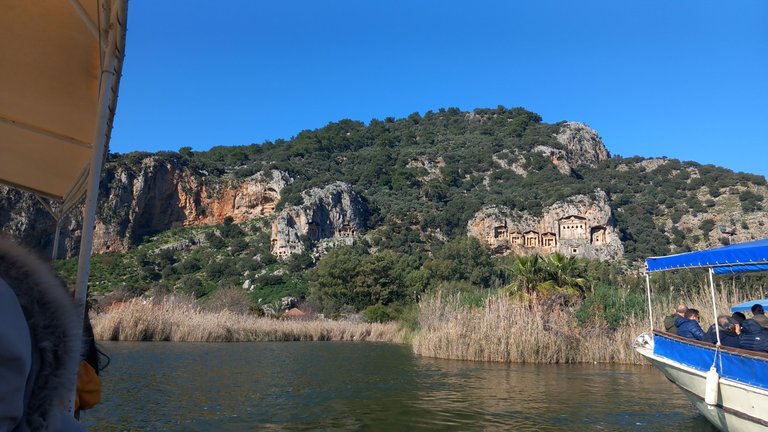
These rock tombs, which offer a very impressive view when viewed from Dalyan, especially the shadows created by the morning and evening sun, turn these structures into a living work of art, said the head guide, who also said that tourists want to come at this time (if they come). I would like to say again that these tombs, which are part of the cultural heritage of Kaunos, are today included in the UNESCO Tentative World Heritage List and are one of the most important sources of knowledge about the thousands of years of history of the ancient city.

The End
Even though there are many more buildings in this ancient city, I don't want to bore you with them anymore because there are a few more buildings such as the domed church and the round building, but the information about them is very little and much less than I can give you information.
Therefore, I skip them and finish my trip to the Aegean region. I hope you liked this ancient city because it was among the unforgettable memories for me. Especially the part where I saw Caretta carettas.
See you tomorrow. Take care of yourself, stay with health and love and please remember that;
You are the only one of you.


Herkese merhabaaa!!!
Umarım iyisinizdir ya da iyi olmaya çalışıyorsunuzdur. Son zamanlarda ben kendimde yazı yazacak motivasyonu bulamadım ama şu anda buradayım ve ne yazık ki Ege bölgesi gezimin son noktası ile buradayım. Buradan sonra İç Anadolu gezim ile devam edeceğim. Yine ne yazık ki bu yıl içerisinde yaptığım gezinin sonuna yaklaşıyoruz. Bu yüzden de ne yazık ki perşembe günleri paylaştığım Türkiye'nin Her Yerinden serisini artık paylaşmayacağım. Bu serinin bu kadar kısa sürede bitirmek istemiyorum.
Şimdi ise sizinle yine Muğla, Dalyan'dayız. Bu sefer biraz deniz üzerinden ilerleyip bir yere gideceğiz. İztuzu Plajı'ndan sonra günümüz orada bitmedi ki bundan da linkini eklediğim yazımda da bahsetmiştim. Yolda harika şeylere tanık olduğumdan da bahsetmiştim ve şimdide onlardan bahsetmek istiyorum. Ayrıca yazımın devamında da UNESCO Dünya Mirası Geçici Listesi'nde olan Kaunos Antik kentinden bahsedeceğim.


Ulaşım
Kaunos'a ulaşabilmek için kara yolunu kullanmanın zor olduğunu duydum başrehberimden. Yani yanlış hatırlamıyorsam neredeyse imkânsız. Bizde bu yüzden deniz yolunu kullandık ve neredeyse 110 kişi için 3 tekne ayarlandı. Bu teknede güzel günün sonunda biraz daha güzel vakit geçirebilmek için müziğe eşlik ederek ilerledik.
Tabii olmazsa olmazımız şarkılara karga seslerimizle eşlik de ettik 😂 Aslında bu yolun biraz daha kısa sürmesini bekliyordum ama gittikçe gittik. Yarım saat kadar.




Harika manzaralarla karşılaştığımızı bu şekilde size göstermek istedim çünkü bence bunlar nefes kesici derecede güzeller. Yürüyerek veya herhangi bir şekilde ulaşamayacağımız yukarıda gördüğünüz kaya mezarları da yukarıda görebilirsiniz. Ayrıca bu sazlıkların da Antik Yunan Mitolojisi'nde hikâyesi var ve isterseniz bu hikâye hakkında da başka bir zaman konuşabilirim.
Bahsetmek de isterim ki yolumuzda İztuzu Plajı'nın sakinleri olan Caretta carettaların dansına da şahit olduk. Çok güzeldi. Eğer devam etseler zorla gemiyi kıpırdatmaz izlemeye devam ederdik. Herkes büyülenmiş gibi Carettalara odaklanmıştı ve video çekiyordu. Bir daha ne zaman denk gelinir böyle bir şeye ki? Oldukça şanslıydık.

Kaunos Antik Kenti
Antik Dönem Likya ve Karya arasında yer alan bu antik kentin tarihi MÖ 10. yüzyıla kadar dayanıyor. Yaklaşık 3000 yıldan bahsediyoruz. Ben biraz bunu yuvarladım fakat yine de az bir zaman değil. Ayrıca dönemin Likya'sı ve Karya'sı ile bu kentin hem ulaşım hem de ticaret açısından anahtar yerlerden biri olduğunun yorumunu yapmak mümkün.


Biraz da isminden bahsedeyim çünkü bu isim Kral Miletos'un oğlu Kaunos'tan geliyor fakat bu ismi almasını şahsen ben çok beğenmedim. Sebebi ise Kaunos'un öz kız kardeşine olan yasak aşkı. Bu aşkın öğrenilmesinden sonra ise Kaunos buraya sürülüyor fakat kenti bomboş bir yerden bir yaşam alanına çeviriyor. İyi mi yapmış kötü mü yapmış bilemiyorum fakat herhangi bir iyiliği varsa bu kentin 2014'ten beri UNESCO Geçici Dünya Mirası Listesi'ne dahil edilmesi. Bu birazdan bahsedeceğim kaya mezarları oldukça önemli.


Kent ilk zamanlarında Likya'ya ait olsa da daha sonra Karya'nın topraklarına dahil oluyor. Ayrıca coğrafi konumu sayesinde de sürekli el üstünde tutulmuştur desem yeridir sanırım. Dünyanın değişiminin sebep olduğu denizin çekilmesindense alan şu anda bataklık gibi. Zaten yukarıdaki fotoğraflardan az çok anlamışsınızdır diye düşünüyorum. Biz çamur gördüğümüz yerelere girmedik. Biraz daha güvenli davrandık. Gün sonu olsa da sonuçta korumamız gereken kıyafetlerimiz vardı.
Tabii bu durumdan etkilenen sadece günümüz insanı değil, eski zamanlardan çekilmeye başlayan denizden dolayı ticari önemini de kaybettiğini söyleyebiliriz.


Bir de eklemek isterim ki Heredot’un anlatımına göre Kaunoslular, Karia’nın yerli halkından olmalarına rağmen kendilerini Giritli olarak tanıtırlarmış. Ünlü coğrafyacı Strabon ise Kaunos’un ağzı kapanabilen bir limanı ve tersanesi olduğu yazıyor.

Tiyatro
Kaunos Antik Kenti'nin tiyatrosu, antik dönemin mimari ve kültürel zenginliğini yansıtan en önemli yapılardan biri. Kentin en yüksek noktalarından birinde, yamaca oturtulmuş olan tiyatro, 5000 kişilik kapasitesiyle daha önce ziyaret ettiğimiz tiyatrolardan biraz daha küçük olsa da yine de göz kamaştırıcı.
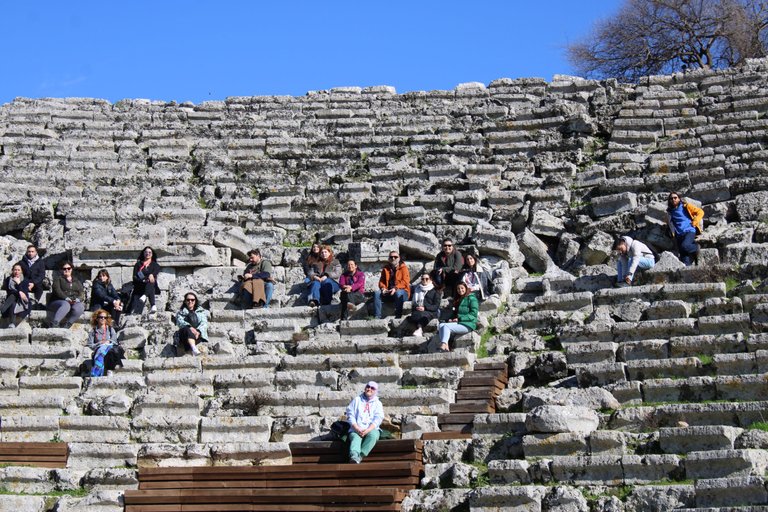
Yukarıdaki fotoğrafta görebileceğiniz alt kısıma doğru olan farklı rengin olduğu basamakları biraz da bizim güvenliğimiz için bu şekilde yapmışlar. Priene Antik Kenti tiyatrosu gibi iyi korunamamış olsa da fena değildi. Bir de bazı kısımların yaması ile biraz daha tırmanılabilir hâle gelmiş.


Roma Hamamı


Yukarıda ticari ve popüler kentlerden birisi olduğunu söylemiştim. Bu hamam da bunun sonuçlarından birisidir diyebilirim malum Antik Roma'da hamamlar sadece temizlik amaçlı değil aynı zamanda da sosyalleşme amacı ile de kullanılırdı. Hatta daha önce gördünüz mü bilmem ama Latrina denilen tuvaletlerde de durum çok farklı değildi. Düşünsenize günümüzde oldukça gizli olan bu ihtiyaç zamanımız eskiden 10 kadar insanın olabileceği bir alandaydı. Bu kadar sosyal olan bir milletin hamamının da ayrı olması garip olurdu.

Kaya Mezarları
Kaunos’un kaya mezarları, antik kentin en ikonik ve etkileyici yapıları arasında yer alıyor bence. MÖ 4. yüzyıla tarihlenen bu mezarlar, yüksek kayalıklara oyulmuş görkemli cephesiyle antik kentin yolunda ilk karşınıza çıkan şeylerden biri. Kentin kurucusu Kaunos ve soyluların anısına inşa edildiği düşünülen mezarlar, Likya tarzı mezar mimarisine de ev sahipliği yapıyor. İyonik sütunlarla bezeli tapınak cepheli bu mezarlar, hem inşa teknikleri hem de sanatsal detaylarıyla dikkat çeker.

Bu mezarlar, yalnızca birer anıt olarak değil, aynı zamanda dini ve kültürel anlamlar taşıyan yapılar olarak düşünülmüş. Mezarlarda yer alan üç taş yatak, ölülerin uzatıldığı alanlar tasarlanmış olduğunu baş rehberimiz bize söyledi ve dönemin ölü gömme geleneklerine dair ipuçları verdiğini de ekledi. Mezarların konumları, Kaunos halkının ölümden sonraki yaşama dair inançlarını yansıtıyor; yüksekteki konumları, ölenlerin tanrılara daha yakın olmaları amacıyla seçilmiş olabilir. Bu tarz yorumlar yapmayı sevdiğimi fark etmişsinizdir 😂

Dalyan’dan bakıldığında oldukça etkileyici bir manzara sunan bu kaya mezarları, özellikle sabah ve akşam güneşinin yarattığı gölgeler, bu yapıları adeta canlı birer esere dönüştürdüğünü söyleyen baş rehber aynı zamanda da turistlerin bu saatlerde (gelirlerse eğer) gelmek istediklerini söyledi. Kaunos’un kültürel mirasının bir parçası olan bu mezarlar, bugün UNESCO Geçici Dünya Mirası Listesi’nde yer aldığını tekrar söylemek isterim ve antik kentin binlerce yıllık geçmişine dair bilgi birikiminin en önemli kaynaklarından biridir.

Son
Bu antik kentte çok daha fazla yapı olsa dahi sizi artık bunlarla sıkmak istemiyorum çünkü Kubbeli Kilise, yuvarlak yapı gibi birkaç yapı daha bulunuyor fakat bunlarla ilgili bilgiler çok az ve size bilgi verebileceğimden çok daha az.
Bu yüzden de bunların atlayarak Ege bölgesi gezimi bitiriyorum. Umarım bu antik kenti beğenmişsinizdir çünkü benim için unutulmaz anıların arasında yer aldı. Özellikle Caretta carettaları gördüğüm kısım.
Yarın görüşmek üzere. Kendinize dikkat edin, sağlık ve sevgiyle kalın ve lütfen unutmayın ki;
Bu dünyada sizden başka bir tane daha yok.

Previous Chapters
From All Over Turkiye 21 / Tükiye'nin Dört Bir Yanından 21
From All Over Turkiye 20 / Türkiye'nin Dört Bir Yanından 20
From All Over Türkiye 19 / Türkiye'nin Dört Bir Yanından 19
From All Over Türkiye 18 / Türkiye'nin Dört Bir Yanından 18
From All Over Turkiye 17 / Türkiye'nin Dört Bir Yanından 17
From All Over Turkiye 16 / Türkiye'nin Dört Bir Yanından 16
From All Over Turkiye 15 / Türkiye'nin Dört Bir Yanından 15
From All Over Turkiye 14 / Türkiye'nin Dört Bir Yanından 14
From All Over Turkiye 13 / Tükiye'nin Dört Bir Yanından 13
From All Over Turkiye 12 / Türkiye'nin Dört Bir Yanından 12
All of my content is written in Turkish first and then with the help of translators and dictionaries below translated in English.
https://www.seslisozluk.net P.S. If you know English AND Turkish, I do that too... If you see a translation discrepancy that was on purpose. I did think this is as proper as I could do. Because there are many differences between these languages.
Not: Hem Türkçe hem de İngilizce biliyorsanız, ben de biliyorum... Eğer çeviri farklılığı görürseniz bunun bilinçli olduğunu bilin lütfen. Bunu yapabileceğim en uygun şekilde yaptığımı düşünüyorum. Çünkü bu iki dil arasında çok fazla fark var.
https://www.deepl.com/translator

